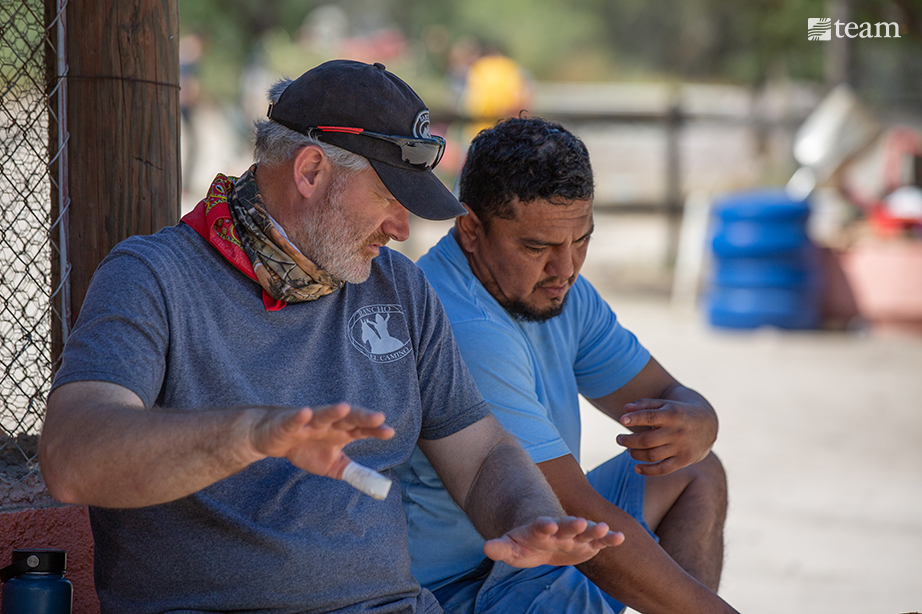
Becoming a Missionary
How Long Should I Be a Missionary?
July 27, 2021
by Jordan

The journey of pursuing missions is unique for each person. God is personal and above all, and He is able to orchestrate all the details of a missionary’s life for His honor and glory.
And yet, as you pursue cross-cultural Christian missions, you might find yourself stuck on this question: How long should you commit to overseas missions service?
Is there really a valuable difference between short-term missions or a mid-term assignment? Should you just jump into long-term missions and commit your foreseeable future to overseas work?
As a TEAM missions coach, I regularly help people walk through these questions, and a big factor is discerning your motives. So, I’m going to share a few key ways to discern your motives and then dive into what each service length has to offer.
1. Talk with Your Local Church Leadership.
Many churches have staff or elders over missions and outreach. However, a trusted leader, someone in ministry or a faithful person in your church who displays godly fruit would be able to help you discern your next steps in missions. You want to communicate with someone who puts the word of God first, will ask hard questions and will pray with you.
So how do you start the conversation? It is much easier than you may think. Ask a church leader to be a part of your missions discernment process. Let them know that you value input and biblical guidance, and that their prayers are needed. You don’t have to have the answers in order to approach church leadership. Rather, give them a voice in your missional call.
TEAM’s Missions Readiness Guide is a great tool for helping you ask and discuss the hard questions with your church. Get yours free!
2. Learn About Missions in Scripture.
If you want to be obedient to God, you need to know Him. You need to be able to discern His voice among others to know what’s in line with His will and what isn’t. And to do this, one needs to know Scripture.
Explore how Jesus trained His disciples in ministry, and read about the Apostles’ journeys in Acts and the epistles. Then go into the Old Testament to explore how God called people to move and serve from the very beginning!
God has given us everything we need in His word to equip the servant of God for every good work (2 Timothy 3:16–17). Missions is a very good work! Spend time with the Lord in His word, and He will lead you.
3. Ask the Holy Spirit to Search Your Heart.
“Search me, God, and know my heart; test me and know my anxious thoughts. See if there is any offensive way in me, and lead me in the way everlasting” (Psalm 139:23–24). Making decisions should always be done with wisdom and discernment, led by the Holy Spirit. Ask the Spirit to convict, to lead and to give you wisdom. He will answer your prayers!

Share what God is showing you through His word with your church leadership. And ask them to pray with you for the Spirit’s leading.
Exploring Your Options
With these three principles guiding your discernment process, you’re ready to start exploring the possibilities. Every service length is valuable, but to know which one to pick, you need to know what each one entails.
The Case for Short-Term Missions (2 Weeks to 8 Months)
If long-term missions isn’t on your radar, a short-term mission trip can be a great way to give a season to the Lord and invest in His work.
Many college students fulfill internships overseas with TEAM. Others go to refresh long-term missionaries and provide care or support. Some short-term missionaries with TEAM meet a specific need, such as staffing a summer camp, helping with a conference or teaching a class. There are many opportunities for short-term missionaries to contribute and to grow themselves.
A short-term trip can also give you valuable exposure to missions to help you discern your long-term calling. All TEAM short-termers serve alongside seasoned missionaries, ready to mentor and provide ministry exposure.
There are many nuances to overseas ministry that aren’t the same as working in your home context. So if long-term cross-cultural ministry is something you want to consider, a short-term discernment trip could be the best step.
The Case for Mid-Term Missions (1 to 2 Years)
The next level of commitment is a mid-term assignment, which is one to two years abroad. Mid-term missions opportunities are effective, help form lasting relationships and create greater opportunities to be sanctified and grow deeply.
This commitment is very different from short-term in a few specific ways. You’ll get out of the honeymoon phase and really experience the highs and lows of cross-cultural living. Relationships can be long lasting, as you move in, make yourself at home and struggle through building a life in a new country. There’s also the potential to not just participate in ministry, but also to help lead ministries.

Mid-term service provides greater opportunities for building relationships and exploring the ministries God might be calling to engage in long-term.
Where there is more commitment, many times there is more fruit! But where there is more commitment, there are more struggles to mold you into the likeness of Jesus.
A mid-term assignment can be great for those that are unsure about making the long-term commitment. It allows you to do something beneficial with your time and resources while testing the waters of long-term missions. And many long-term missionaries recommend going the full two years if you truly want to understand what it’s like to serve abroad.
But mid-term service isn’t limited to people considering longer service.
A mid-term assignment can be very fruitful use of a gap year for students or recent grads. Many married couples go on mid-term missions before having children. Still others will choose to use their first year of retirement overseas serving in missions. There are amazing ways to utilize a year or two in missions.
The Case for Long-Term Missions (Over 2 Years)
It takes years to build relationships, trust and see churches established. If your end goal is to see a missional church full of disciples of Jesus in whatever context you’re going, prepare to commit your life to the task.
TEAM field leader Becky asks people to flip the “how long” question on its head. Rather than the length of time that works best for you, think of the length of time that would be most beneficial to those you are going to serve. Think of the context you are going to. Will you need to learn the language in order to minister effectively? Nine out of 10 times, the answer is yes! Or, how open are local people to new relationships? These questions focus more on those you are serving and the best way to steward them, rather than on your own individual discernment.
Oftentimes the honest answers to these questions will lead people to commit to long-term missions. Becky shares that all lengths of service are beneficial, but missionaries are usually more effective in year five than year two.
In the midst of all of our human planning, Becky says, “I do think that even those who are preparing to go long-term today should be prepared to serve in several different capacities and places during their career. The world is truly VUCA today: volatile, uncertain, complex and ambiguous. Perhaps the world has always been that way for those who are vulnerable — but certainly the world changes at a much more rapid pace now than ever before.”
Begin with Prayer
Short-term, mid-term and long-term missions can all produce fruit that lasts. Each person needs to discern, in their church community and with a missions agency, what is wisest in their own context. Begin by praying, and be willing to do some research. All commitments are serious and phenomenal decisions, so be sure to steward the discernment and preparation stage well.
Step into your missions journey with your eyes wide open. Get your free Missions Readiness Guide to help you figure out how long you should serve, what unique challenges you may face and more. Then talk with a TEAM missions coach to explore next steps!
Related articles


